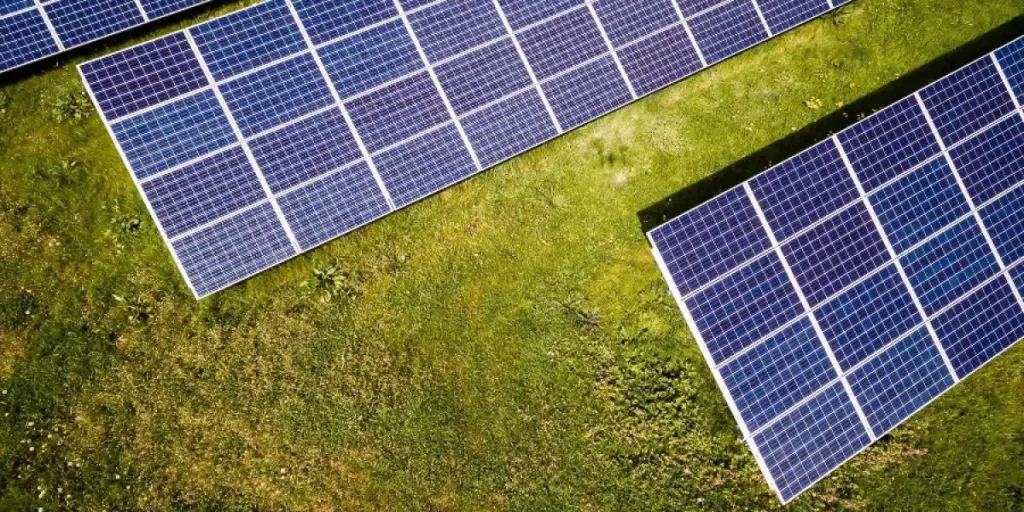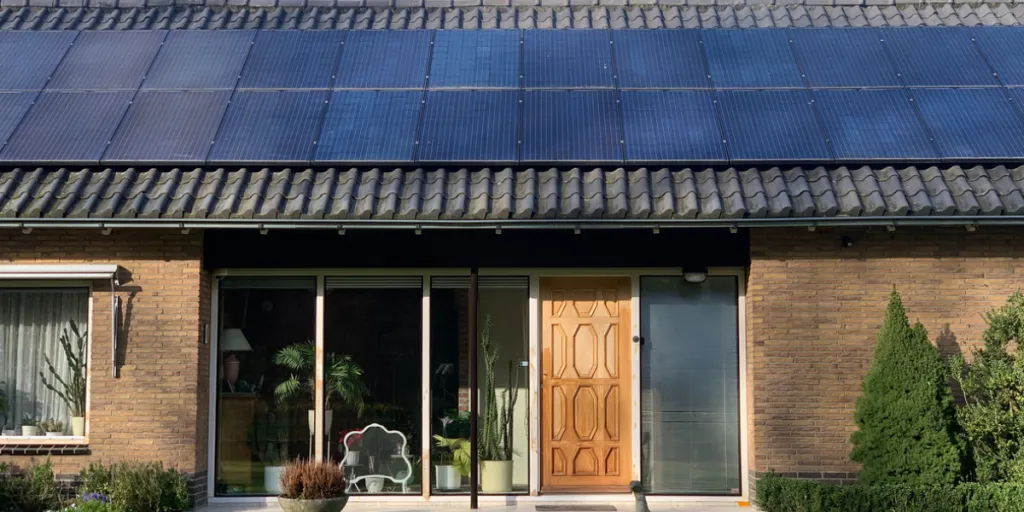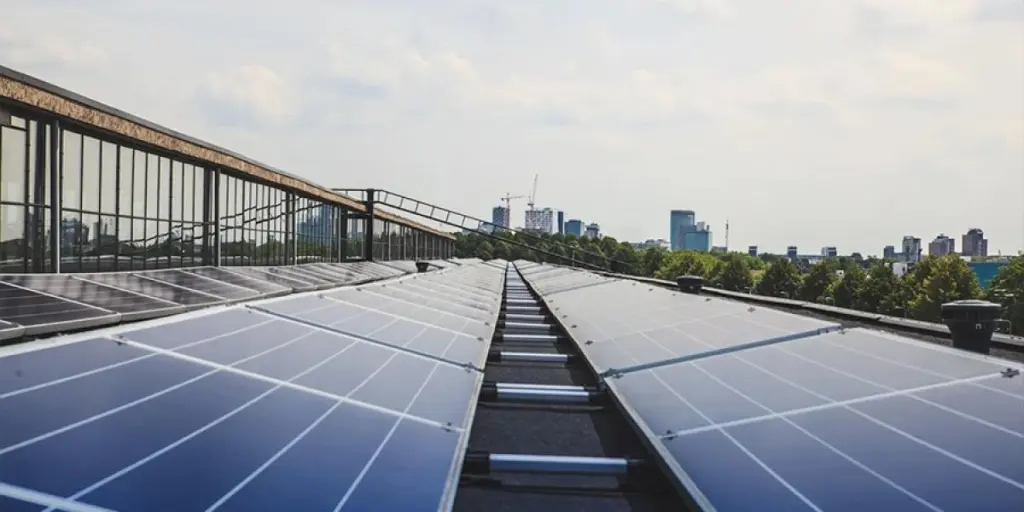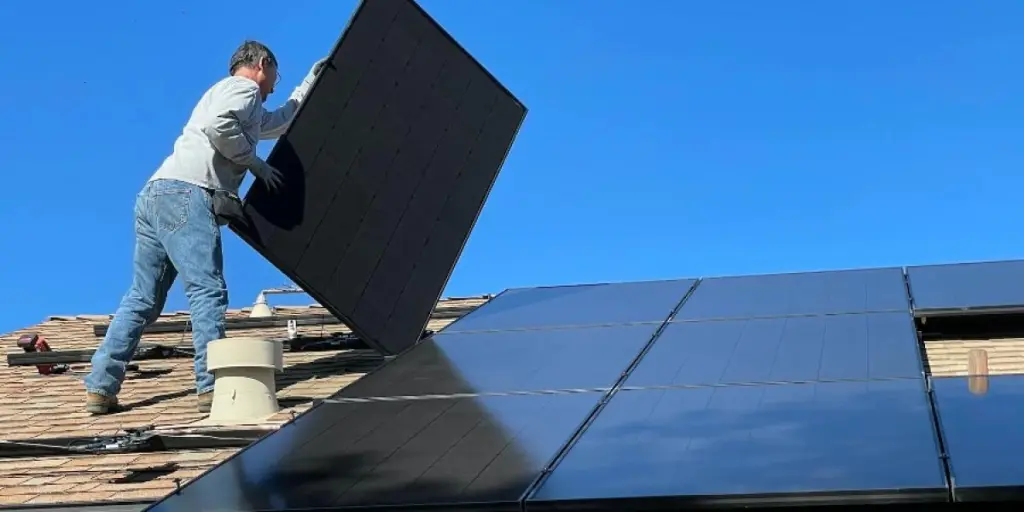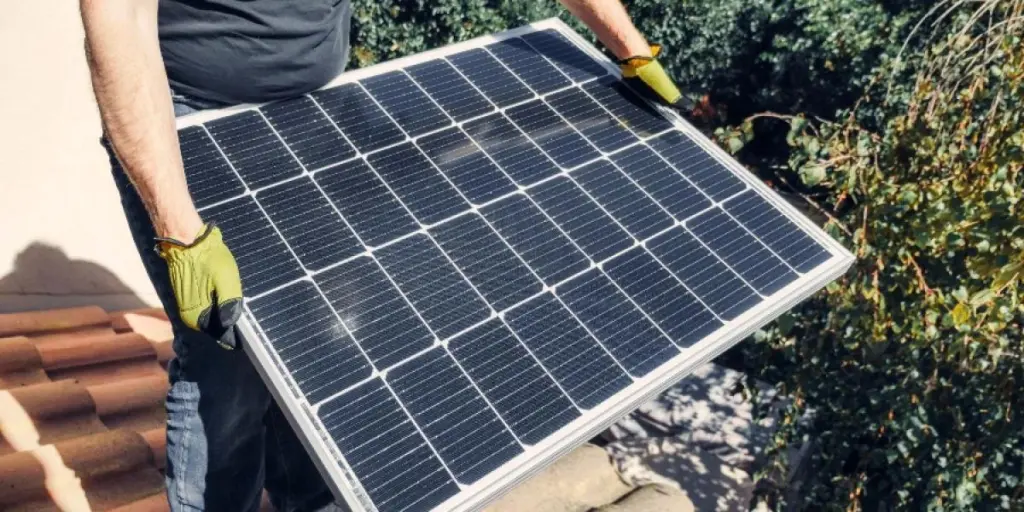The solar powered water pump system functions by absorbing energy from sun rays and using that energy to pump water for agricultural or domestic use. The increased adoption of this new water pumping system by homes and local farmers in some African regions (like Kenya, Tanzania, Uganda, Morocco, Sudan, etc), and large European and American farms is creating more opportunities for the solar water pump market.
In 2019, the solar pump market was valued at US $1.21 billion globally and is poised to grow to US $2.05 billion by 2027, which will amount to a compound annual growth rate (CAGR) of 6.8% from 2020 to 2027. Most countries are creating awareness for the adoption of energy from renewable sources to promote a greener environment and reduce carbon footprints.
Increased usage of solar powered water pumps will minimize CO2 emissions and greenhouse gases, and will help to prevent global warming. The demand for solar submersible pumps and smart solar pumps is on the rise, and with the rate at which new agropreneurs are emerging, the market will continue to grow larger with time.
Read on to learn about solar powered water pumps with good flow rate and how to choose the best solar powered water pump for retail.
Table of Contents
What is a pump flow rate?
Factors that affect the flow rate of a pump
5 different types of solar powered water pumps with good flow rates
Conclusion
What is a pump flow rate?
A pump flow rate is the measurement of the amount of fluid a pump delivers within a given time. Flow rate is a crucial factor to consider when opting for a pumping system since it determines the quantity of fluid that can be produced within a certain timeframe. It is measured in cubic meters/hour (m3/h), liters/minute (L/min), or liters/second (L/sec).
Pumping systems are given a specific flow rate, and these recorded values are usually the maximum flow rate of the product. Each solar pump product undergoes critical examination under harsh conditions which allow for the evaluation of its maximum capacity. This experiment is what helps manufacturers learn about the efficiency and power of the pump.
High-flow solar pumps are addressing water challenges in developing countries. The inadequacy of effective water systems in some countries in Africa is creating an opportunity for the usage of solar pumps for domestic purposes.
Homes in Africa are now embracing pump systems, as they continue to be an efficient, environmental-friendly, and low-cost water solution. Kenya currently has the highest percentage of off-grid solar pump systems in Africa. But in developed countries like the US, solar pumps are utilized mainly for agricultural purposes (like farm irrigation).
Factors that affect the flow rate of a pump
Flow rates are affected by a couple of factors such as land slope, weather conditions, pump size, pump efficiency, etc. Before selecting a solar powered water pump for any remote application consider the following tips.
1. Slope of the land
The texture, shape, roughness, or nature of the land is what determines how water will move from the ground and through the pipe to the land surface. Land slope generally affects the velocity of water flow — high gradient gives rise to high flow, while low gradient reduces the speed of water flow.
For instance, a river flowing down the mountain is usually faster, but water speed reduces drastically when it is flowing through a leveled or flat surface. Thus, the slope of the water channels hugely affects water flow rate.
2. Climatic conditions
Weather conditions are one of the key factors that influence pump flow rate. In hot weather or moments of high sun rays, much energy is absorbed through the solar panels and used when pumping water.
On the flip side, cloudy days and less sunny days give rise to low flows because of the solar panel’s inability to absorb high energy. High-flow pumping is best achieved during sunny days.
3. The efficiency of the pump
The efficiency of a solar water pump is used to determine the amount of power a pump requires to produce fluid. Each of these solar fountain pumps is designed with varying efficiencies — some machines’ efficiency is low while some is high.
Pumps with low efficiency require more energy to pump out enough water. In such scenarios energy is usually lost to heat within the system. High-efficiency pumps use little energy to supply water with its given flow rate and pressure.
4. The size of the pump
When selecting a solar pump for your business, consider choosing a sizable pump, because pump size determines the amount of water a pump can deliver. Unlike small pumps (with small pipes) huge pumps generally convey more fluids.
Trying to pump water using a small hose pipe or pipes with kinks or blockages can create back pressure, and back pressure minimizes the quality of liquids that can make it to the other end of the hose. When pumping water through constricted space more energy is required to force the liquid through the small hole.
5. Horsepower of the pump
In a solar pump, horsepower has to do with the highest number of solar panels that the system can operate with. Most low-flow pumps are supported with so many panels since they require a lot of energy to work efficiently.
So, high horsepower doesn’t necessarily mean that their system will pump more water faster. While checking the stated horsepower, also confirm the flow rate value.
6. The solar photovoltaic level
Photovoltaic systems contribute to the alteration of the solar pump’s flow rate. When the number of PV cells is higher, energy absorbed is increased, which means more energy is converted. This will automatically increase the flow rate, implying that there is more energy available for pumping water.
Although solar powered pond pumps with a lot of solar PVs don’t always create a high flow rate, most low-efficiency solar pumps come with a lot of PVs to increase their energy absorption, but there is also a great amount of energy loss in the system. Buying low-efficiency pumps with many PVs might be a waste of money, because there is no guarantee of a high flow rate.
5 different types of solar powered water pumps with good flow rates
1. Submersible solar powered water pump
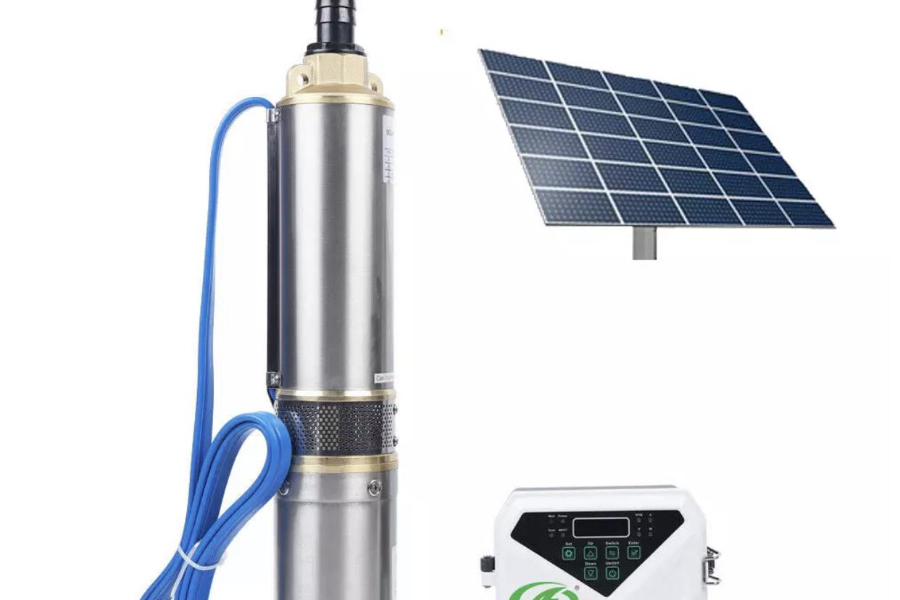
This solar powered water pump helps in water management and irrigation in farms and gardens. It comes with a set of amazing features, which include a permanent magnet DC brushless synchronous motor, stainless steel pump shaft, double bearing, alloy mechanical seal, MPPT controller, and more.
Features:
- Max. flow: 6,000 liters per hour
- Max. head: 56 meters
- Power: 750 W
- Permanent magnet DC brushless synchronous motor
Price: $150.00 – $199.00
Pros:
- Anti-dry run protection
- Voltage, current, power protection
- Stainless steel pump shaft
- Double bearing; motor base works better under more axial pressure
- Alloy mechanical seal
- Has a longer working life and high reliability
- Intelligent water shortage protection
- MPPT controller
Cons:
- Requires close monitoring
- Demands maintenance
- Weather-dependent
2. Plastic impeller borehole pump
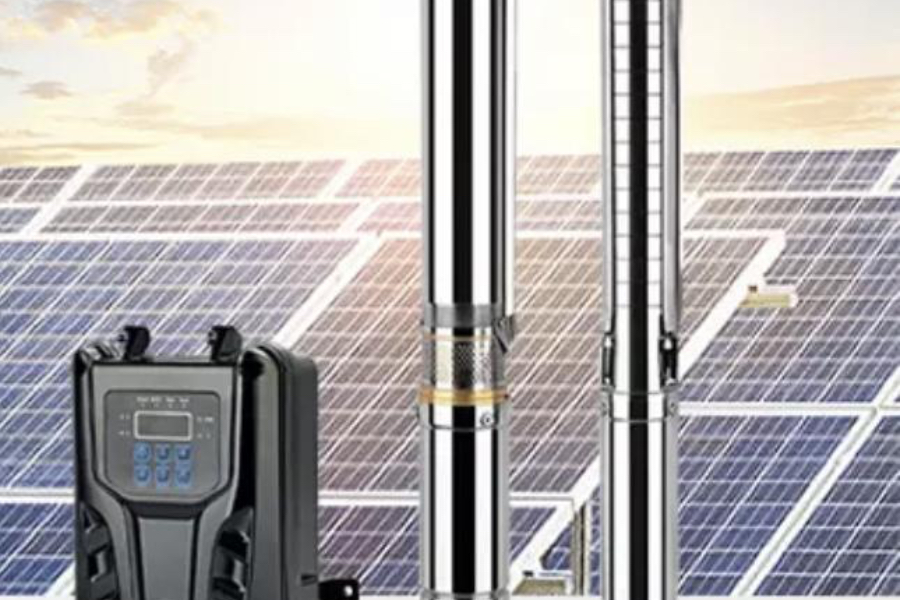
This is a high-flow DC solar submersible borehole pump with high-performance motors and an MPPT function controller. The product boasts a digital display of power, voltage, current, speed, and others. This is a popular type of solar powered farm water pump and can also be used in gardens, homes, and industrial areas.
After installation, the panels receive power through sun rays and use the energy to pump water. The equipment is reliable, effective, and accompanied by fantastic customer service.
Features:
- Brushless solar pump with plastic impeller
- Flow rate up to 67 liters per minute
- Inlet and outlet: brass or cast iron
- High/low voltage protection, over current/overload protection
- Digital display of power, current, voltage, speed, and other working conditions
Price: $86.00 – $90.20
Pros:
- High-performance motor with permanent magnets
- Has vast application: farmland irrigation, gardens, domestic use, civil, and industrial application
- Viable for desert water intake and deep well water intake
- Has a longer working life and high reliability
- MPPT function controller
- Offering pre-sales and after-sales support
Cons:
- System is dependent on solar radiation levels
- Risk of theft of panels
3. High-pressure solar surface pump
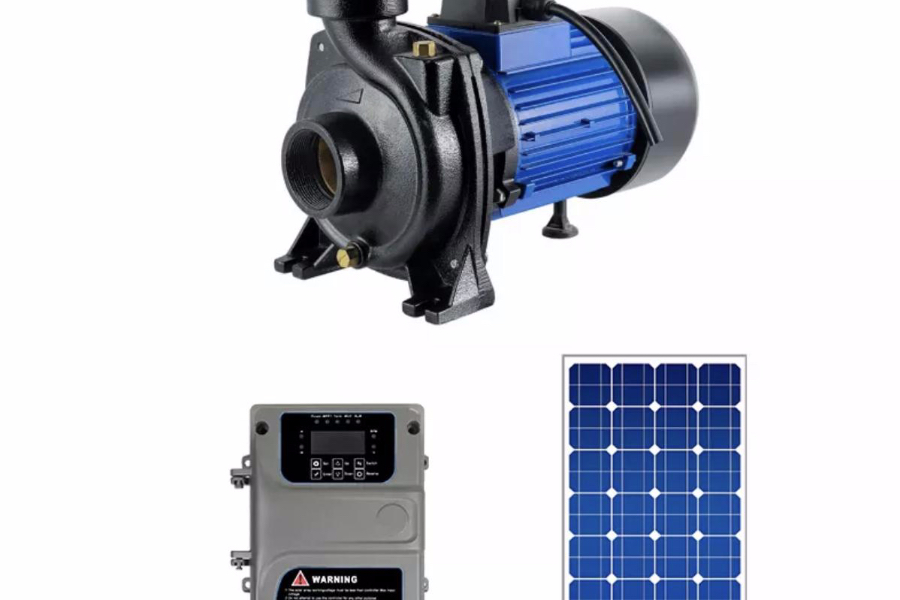
These high-flow rate centrifugal water pumps are designed to deliver best-in-class efficiency. With its high-precision rotor, bearing, and pressure controllers, you can save a lot annually in terms of energy costs.
The pump has vast application and can be used for farmland irrigation, mountain water supply, underground water intake, and domestic water supply.
Features:
- High-precision rotor
- Precision bearing
- All copper wire design
- Different material impeller
- Low lift and large flow, fit for irrigation
- Warranty: 1 year
Price: $106.00
Pros:
- High efficiency
- Has vast application: farmland irrigation, mountain water supply, underground water intake, and domestic water supply
- Viable for desert water intake and deep well system water intake
- Used for low-viscosity fluid
Cons:
- Lacks suction power (uses rotation)
- Requires priming
- Low to moderate efficiencies
- Weather-dependent
4. High flow rate solar DC pump
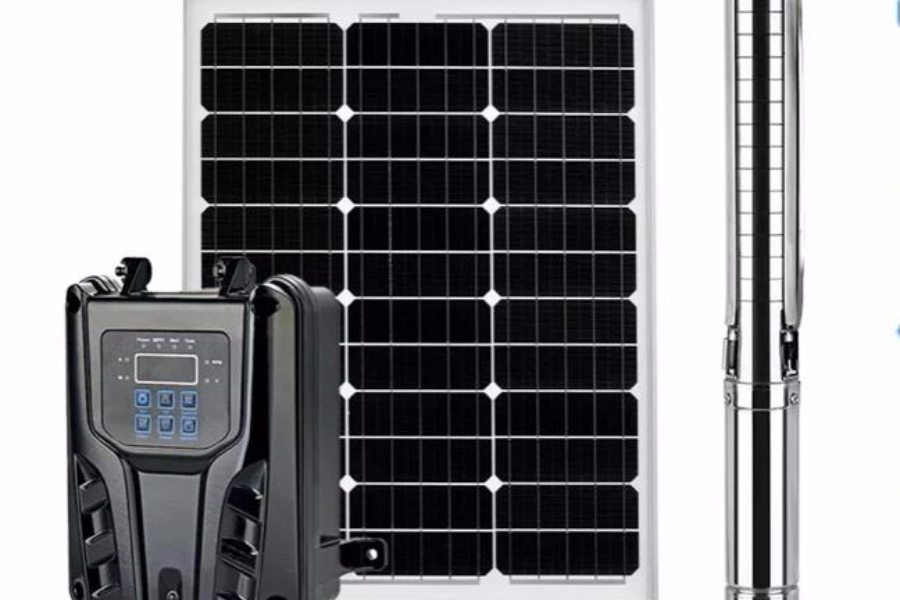
This high-quality solar power pump comes with unique features which include corrosion resistance, stainless steel design, high efficiency, durability, etc. The pump impeller, casing, inlet, and outlet section of the pump and shaft were designed with stainless steel.
The solar pump is accompanied by some exchangeable components and mechanical seals. The MPPT controller enables easy operation and system management. This high-quality stainless steel impeller DC pump is mainly used to convey fluids like mineral water, pure water, soft water, light oil, etc.
Features:
- Brushless solar pump with stainless steel impeller
- Flow rate up to 67 liters per minute
- Inlet and outlet: stainless steel
- Motor: permanent magnet DC brushless motor
- MPPT controller
Price: $88.40 – $113.00
Pros:
- Has high-temperature resistance
- Has vast application: agricultural and domestic use
- Good corrosion resistance
- High durability
- Offers easy cleaning
- MPPT function controller
- Offering pre-sales and after-sales support
Cons:
- Weather dependent
- Possibility of shaft deflection and vibration due to high weight of the steel
5. Centrifugal solar powered water pump
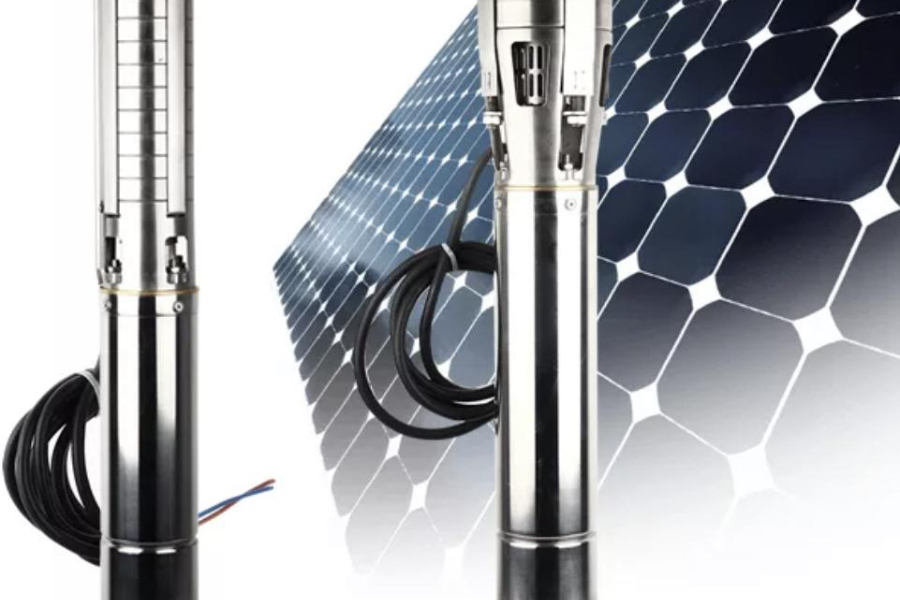
DC brushless solar submersible water pump is an environmentally friendly water supply solution, fitted with a permanent magnet motor and built-in electronics that allow efficient use of energy from nature.
The DC solar submersible pump is programmed to adapt to the characteristic weather profile of any given area. It has a vast application which includes, drinking and living water supply, garden irrigation, agricultural irrigation, livestock water supply, and fountains.
Features:
- Brushless solar pump with stainless steel impeller
- Max. flow: 1.0 – 68 m3/hr
- Motor: DC motor
- 100% copper wire, cold-rolled silicon steel sheet
- 304 stainless steel shaft, motor body, impeller
- Advanced controller with MPPT technology for maximum solar power
- Lifetime: 8–10 years
Price: $539
Pros:
- Environmentally friendly
- High energy storage capacity
- Has vast application: agricultural and domestic use
- Wear and corrosion resistance
- High durability
- Max. medium temperature up to +40ºC
- Easy installation, maintenance-free
- Offering pre-sales and after-sales support
Cons:
- Weather-dependent
- Large weight
- Expensive
Conclusion
Solar powered water pump technology is ushering in new agricultural solutions to the world, especially in African countries. This technology now allows farming communities in Africa to irrigate their crops on a dependable yearly basis.
Each of these solar pumps are equipped with unique features that are focused on introducing solutions that match the needs of end users. Some of this equipment is accompanied by software systems that enhance their operation and functionality. Check out some solar powered water pump suppliers’ products on Alibaba.com to discover more efficient options.
